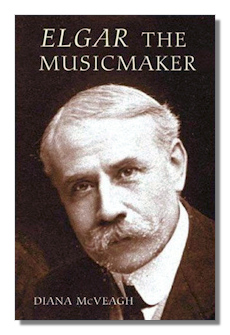
The Internet's Premier Classical Music Source
Related Links
-
Introduction
Acoustics
Ballet
Biographies
Chamber Music
Composers & Composition
Conducting
Criticism & Commentary
Discographies & CD Guides
Fiction
History
Humor
Illustrations & Photos
Instrumental
Lieder
Music Appreciation
Music Education
Music Industry
Music and the Mind
Opera
Orchestration
Reference Works
Scores
Thematic Indices
Theory & Analysis
Vocal Technique
Search Amazon
Recommended Links
Site News
 Book Review
Book Review
Elgar the Musicmaker

Diana McVeagh
Boydell & Brewer, 240 pages
ISBN-10: 184383295X
ISBN-13: 978-1843832959
Diana McVeagh is one of several recognized Elgar biographers. Her Edward Elgar: His Life & Music appeared in 1955, and she wrote the "Elgar" article in the New Grove Dictionary of Music and Musicians. The first half of her older book was a biography of Elgar. This new volume is entirely an analysis of his music. It is organized chronologically by composition and appears to cover everything Elgar wrote. The overall structure is a sort of minimalist biography where Elgar's life is a tapestry woven around his music.
The treatment of each piece varies in length and comprehensiveness. With some major works, McVeagh lays the groundwork and background first and adds her analysis. With the other pieces, she combines the two. Some commentary is subjective; most is admiring, but McVeagh will point out where Elgar came up short. Her prose is concise, personal, at times quirky, and often technical, detailed, and analytical. To get the most out of those technical descriptions, a score is required, a point I suspect McVeagh agrees with, given her frequent references to score numbers ("score cues") and the paucity of musical examples that may be a dealbreaker for some readers. The book's overall production is clean and simple, with photos, a comprehensive list of pieces, arrangements, and orchestrations, plus indexes of people and works.
Readers will appreciate McVeagh's Biblical, historical, and musical guide through The Apostles, The Kingdom, and The Dream of Gerontius. Her treatment of the chamber music is clean, clear, and informative. Her account of Enigma Variations is detailed to the point where I doubt you'd find its equal other than in books devoted to the work or in journal articles. McVeagh is especially good at explaining why a piece "works." I usually dislike virtuoso concertos, but this commentary on the Violin Concerto helped show me why I love this one. "[T]he bravura is seldom just decorative: almost every twist and turn is organic and poetic…rubato, dynamics, register, compass, colour…subtle lingerings and hastening that a fine performer makes sound spontaneous…The gentle opening theme of the Andante is flavored by the extra tang of wind on the last chord of each phrase. When the violin sings, it leaps up rapturously…timpani rolls deepen the emotion."
There are some surprising lapses. McVeagh rushes though the symphonies, especially the Second. For the First, her discussion of the opening theme is fascinating, but she says little about the sublime transition between the Second and Third movements, and Elgar's beautiful transformation of the somewhat ungainly opening theme of the Finale.
McVeagh latest take on Elgar doesn't replace a good standard, modern biography. It doesn't intend to and need not, for there are several of those. The most readable is Michael Kennedy's Portrait of Elgar; the most comprehensive is Jerrold Northrup Moore's Edward Elgar: A Creative Life.
Copyright © 2008 by Roger Hecht.


















